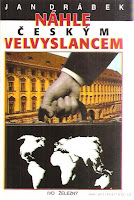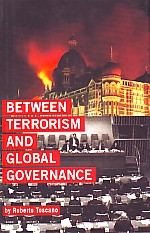I have received from Amb. Jaroslav Olša, jr. , current Czech Ambassador to Seoul, some interesting information about Czech diplomat-writers.
Here is the list of books that Amb. Olsa has kindly provided.
"A very basic list of Czech
diplomats-writers of the last two decades
The first post-communist democratic foreign
minister of Czechoslovakia (passed away last year) Jiří Dienstbier, wrote at
least three books connected with foreign policy, one of his successors,
Jaroslav Šedivý, has already published three volumes of his memoirs covering
his ambassadorship in France, his ministerial times and the third one about his
last posting as Ambassador to Brussels.
But the list of other Czech diplomats having varous books at their
credit seems to be incredibly long as they are not only memoirs writers, but
also historians or fiction writers.
- former Ambassador to Germany and Austria /and shortly Minister of
Education/ Jiří Grůša was predominantly writer and only secondary a diplomat,
who wrote numerous novels and non-fiction dealing with Central Europe, he also
served as a president of PEN International a few years ago.
- current Czech Ambassador to Ireland Tomáš Kafka is a prominent
essayist and poetry writer as it is also current Ambassador to the Netherlands Jaroslav
Horák.
- former Ambassador to Thailand and Cambodia Jiří Šitler (now Ambassador
to Romania) wrote three books on Czech(oslovak)-Thai and Czech(oslovak)-Cambodian
relations.
- former Ambassador to Nigeria Juraj Chmiel (later became Minister for
European Affairs) published a travelogue on West Africa.

- current Ambassador to Turkey (and previously to Portugal, Kenya and
Brazil) Václav Hubinger published an encyclopedia of diplomacy and also an
ethnography book on canibalism.
- former Ambassador to Ethiopia Zdeněk Poláček authored not only two
dictionaries of Amharic but also translated widely from this language as well
as Ge´ez.
- former Ambassador to Egypt Břetislav Vochala is an author of numerous
books on Egyptology, as he is one of the leading world Egyptologists.

- former Ambassador to Kenya (and later on Director of Diplomatic
Protocol) Jan Drábek wrote a pseudo novel about (his) experiences in East
Africa and humorous tales about his work as a protocol chief, previously –
while living in the United States and Canada – he was already published
novelist.

- former Ambassador to Chile and Venezuela Jiří Jiránek wrote a
travelogues about Chile and Venezuela and neigbouring countries, and a
significant study on history of Czech immigration there.
- two former ambassadors to the Holy See (František X. Halas and Pavel
Jajtner) also wrote their diplomatic memoirs, while the former one also a
published a book about the modern history of a Sovereign Order of Malta.
- former Ambassador to Belgrade Judita Šťouračová wrote two books about
trade diplomacy.
- former Ambassador to Jordan and later on Turkey Tomáš Laně wrote
History of Turkey and at least one more book and also Czech-Turkish dictionary.

- former Ambassador to the Philippines and Venezuela Stašek Slavický
published at least two titles on South East Asia.
- former charge d´affaires to Iraq during the late Saddam Hussein´s
times Dušan Belica wrote (jointly with his son, who is a journalist) a kind of
modern history of Iraq/diplomatic memoirs.
- former Ambassador to Thailand Jan Bečka wrote History of Burma.

- former chargé d´affaires to the DRC Pavel Mikeš published at least
three books of translations from Amharic and Somali as well as an acclaimed
travelogue about Ethiopia.
- former Ambassador to India Odolen Smékal was an award-winning poet
writing in Bengali and also a translator from at least three Indian languaes
and author of books and scholarly articles on India.
- former Ambassador to Hungary Marvan was a noted linguist and he
published numerous books on the subject.
- former Ambassador to Slovenia and Kuwait and well-known Arabist Jana
Hybášková (later on Member of European Parliament and currently EU Ambassdor to
Iraq) wrote two books on her experience in the Middle East.
- former Ambassador to Ghana Vladimír Klíma published widely on African
literatures, translated many African fiction and published at least two
travelogues based on his work in West Africa.
- current Ambassador to South Africa Blanka Fajkusová wrote a book about
history of OECD.
- former Ambassador to Indonesia and Consul General to Karachi Jaroslav
Olša (my father) published both Czech-Indonesian and Indonesian-Czech
dictionary, edited and translated an anthology of modern Indonesian short
stories as well as published legends and fairy tales from New Guinea and
Malaysia.

- and - last but not least - myself, now Ambassador to the Republic of
Korea and formerly to Zimbabwe, I have published book History of Zimbabwe,
Zambia and Malawi (with Otakar Hulec), plus three titles on modern Zimbabwean
art and
one book about early Czech(oslovak) travellers in Korea and in edition
edited and selected a dozen anthologies of science fiction
The reason for such a high number of writing ambassadors is in fact,
that the newly democratic Czechoslovakia needed new diplomats, and a new
service was thus based on experts from outside the diplomatic service. The
1990s thus saw untypical situation, when almost simultaneously the positions of
ambassadors in Japan, China, India, Indonesia, Iran, Burma /non-resident/,
Ethiopia, Ghana, Nigeria, DRCongo, Egypt, Turkey /to mention only non-European
posts/ were occupied by experts in those countries and languages.
But the trend was already created, and at least dozen other active Czech
diplomats has published at least one title, often travelogues (Jana Chaloupková
has five titles on various Asian countries and Brazil on her credit), or novels
(like Marek Toman), Markéta Hejkalová, formerly diplomat in Finland, became
vicepresident of PEN International and a noted Czech novelist etc."
































 Italian former Ambassador in New Delhi analizes nowadays India with a look to its past but mainly focusing on the future perspective of the country. Colonial legacy, political equilibria, contrast between countryside and cities, the role of political parties and media and inter religious relations are all topics examined by Ambassador Armellini who served in India from 2004 to 2008.
Italian former Ambassador in New Delhi analizes nowadays India with a look to its past but mainly focusing on the future perspective of the country. Colonial legacy, political equilibria, contrast between countryside and cities, the role of political parties and media and inter religious relations are all topics examined by Ambassador Armellini who served in India from 2004 to 2008.



